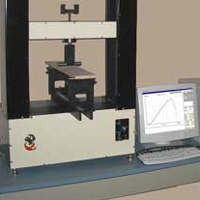Significance of Material Testing
Materials testing is a crucial aspect of engineering and manufacturing processes. It involves subjecting various materials to different testing methods to determine their physical, mechanical, and chemical properties. These tests help engineers and scientists make informed decisions on which materials to use for specific applications, ensuring that the end product performs as expected and meets safety and regulatory standards.
There
are several types of materials testing methods used in different industries,
including tensile testing, hardness testing, impact testing, fatigue testing,
and creep testing. Each of these methods focuses on a specific property of the
material being tested.
Tensile
testing is used to determine a material's strength and elasticity by stretching
it until it reaches its breaking point. During the test, a sample of the
material is pulled in opposite directions, and the force required to break it
is measured. The test helps engineers understand the material's tensile
strength, yield strength, and elongation.
Hardness
testing, on the other hand, measures a material's resistance to indentation or
scratching. It is crucial in industries that use materials that need to
withstand abrasion, such as manufacturing tools and equipment.
Impact
testing evaluates how well a material can withstand sudden impact or shock. It
is critical in industries such as automotive and aerospace, where materials are
subjected to high-velocity impacts.
Fatigue
testing is used to evaluate a material's resistance to repeated stress and strain.
It helps engineers understand how materials react to constant loading, which
can cause damage over time.
Finally,
creep testing measures how much a material deforms when subjected to constant
stress over an extended period. It helps engineers understand how materials
behave under long-term loads and high temperatures, such as in nuclear power
plants and other high-temperature applications.
Regardless
of the type of test used, materials testing is essential in ensuring the
quality and reliability of products that use materials. Engineers and
scientists use the results to design and manufacture materials and products
that meet specific performance requirements and regulatory standards.
In
addition to its practical applications, materials testing also plays a vital
role in research and development. The results of these tests help scientists
and researchers understand the fundamental properties of materials and how they
can be improved or manipulated to achieve specific characteristics.
Materialstesting is a critical aspect of engineering and manufacturing processes. It
helps ensure the quality and reliability of materials and products and is
essential in meeting regulatory standards. With advancements in testing
technologies and techniques, materials testing will continue to play a crucial
role in shaping the future of manufacturing and engineering.


.jpg)


Comments
Post a Comment